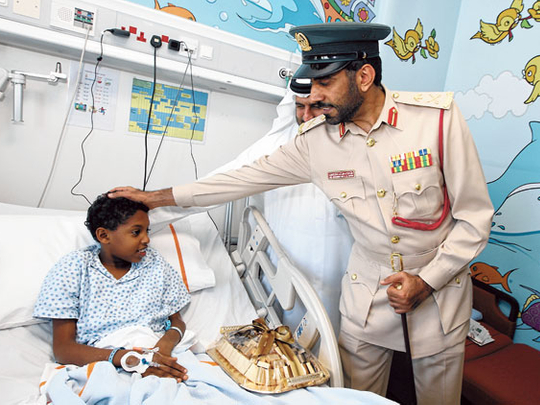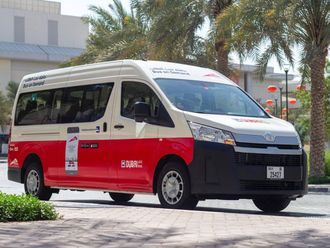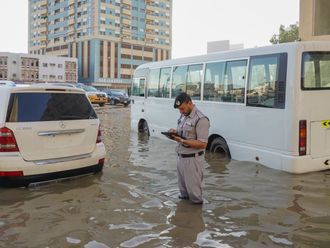
Dubai: Saeed Al Rubayya was driving on a dark two-way road in Al Dhaid last week when he was hit by a car that suddenly entered the road.
He sustained facial injuries and had to undergo surgery to fix a dislocated jaw and broken teeth and was discharged from hospital on Tuesday.
Al Rubayya is 14 years old.
The eighth grade Emirati told his story from his Rashid Hospital bed when Major General Engineer Mohammad Saif Al Zafein, Director of Dubai Traffic Department, visited Rashid Hospital's Trauma Centre.
His 17-year-old brother Musabbah also drives. The two young men take care of the family's livestock after the death of their father.
"Most young men in villages and desert areas drive before they turn 18, and so far there doesn't seem to be a solution for this problem because they are far away from awareness efforts, and boys who grow up in tribal families are expected to grow up fast and become men before they are physically and mentally ready," Al Zafein said.
Al Rubayya escaped with minor injuries, but 33-year-old Mohammad Al Matroushi was not so lucky.
On December 24, the Emirati Military Forces employee was accompanying his friend when their car overturned in Warqa at a speed of 120km per hour.
The friend, who had fastened his seat belt while he was driving and chatting on his mobile, escaped almost unscratched, but Al Matroushi sustained very serious injuries including a fracture in the seventh cervical vertebra (C7), that left him paraplegic (paralysed from the waist down).
Al Matroushi is undergoing physiotherapy to enable him to live as normal a life as possible.
"You must have a message to deliver to your society," Maj Gen Al Zafein told him. "You must make it your mission to inform people about your accident and ask them to fasten their seat belts whether they are drivers or passengers, because your friend, who was wearing a seat belt, was unharmed," he added.
Another Emirati man who suffered severe head injuries was unable to tell his story because he was breathing through a tube.
His mother told Maj Gen Al Zafein about the accident in which Mahmoud, a 24-year-old customs employee, was injured three months ago. He was also not wearing his seat belt when he hit an unmarked speed hump at high speed and his car overturned when he lost control.
Arm broken
"He needs to go for treatment abroad because although he is regaining consciousness, he is unable to speak or move," his mother said.
A desert trip did not turn out so well for Hamad Riza, a 37-year-old Iranian who was dune-bashing on a quad bike with his wife at night when the bike overturned. Riza's left arm was broken, but his wife was uninjured.
"You were lucky because you were driving at a low speed and escaped only with a broken arm, but you could have broken your back, hips or neck," Maj Gen Al Zafein told the man.
Othman Al Hadi Othman, a 11-year-old Sudanese boy, was walking to a nearby mosque to pray two weeks ago when he was hit by a car in Karama. He had to undergo surgery to fix a broken leg and is recovering from surgery. The child will have to undergo extensive physiotherapy.
"It is the parents' responsibility to supervise their children and not allow them to cross roads unattended," Maj Gen Al Zafein said.
"Even if a child is going to the mosque to pray, he should be accompanied by an adult because he does not have great awareness, and pedestrians should protect themselves and not expect cars to stop when they cross the road at an undesignated pedestrian crossing," he said.












